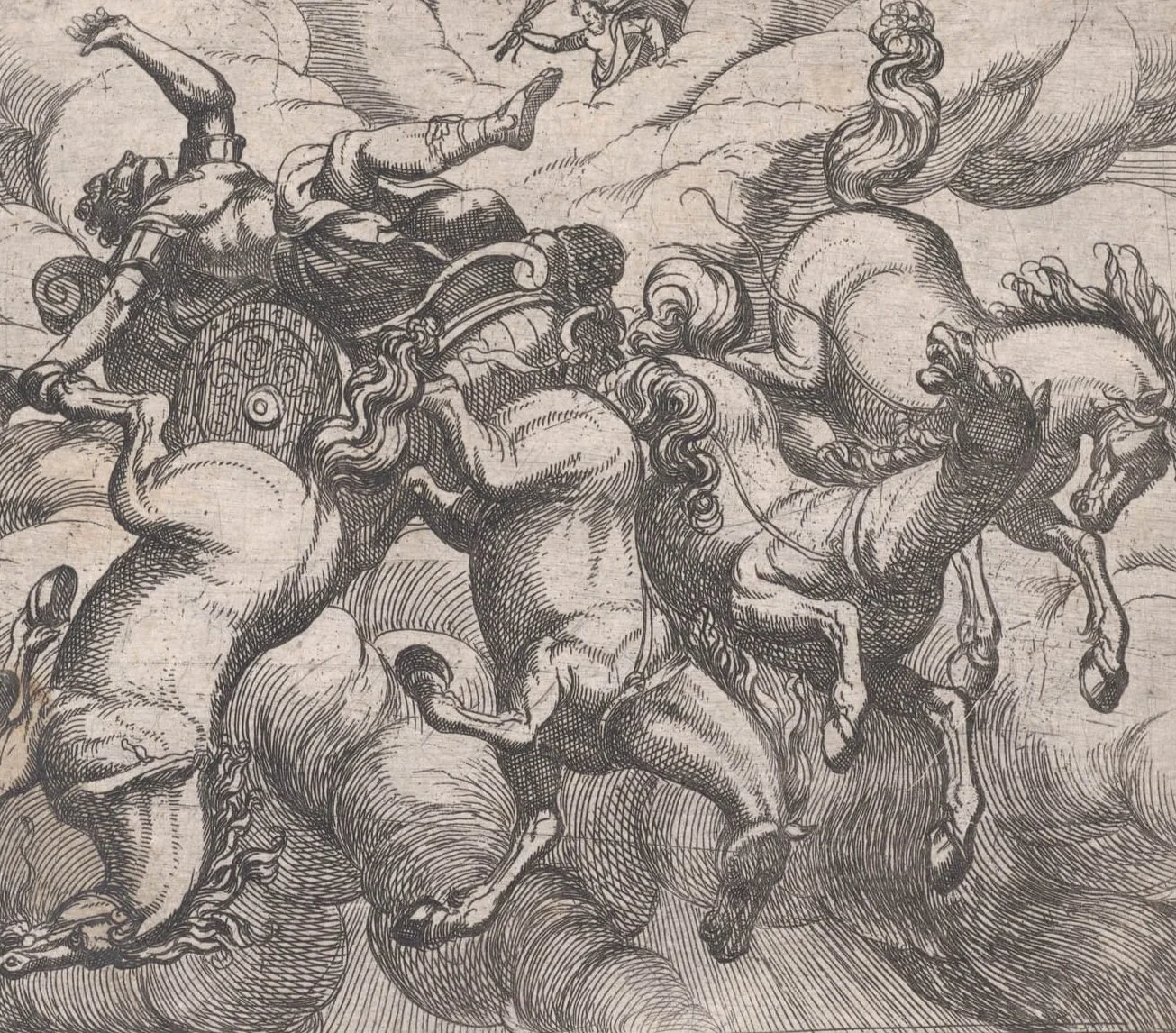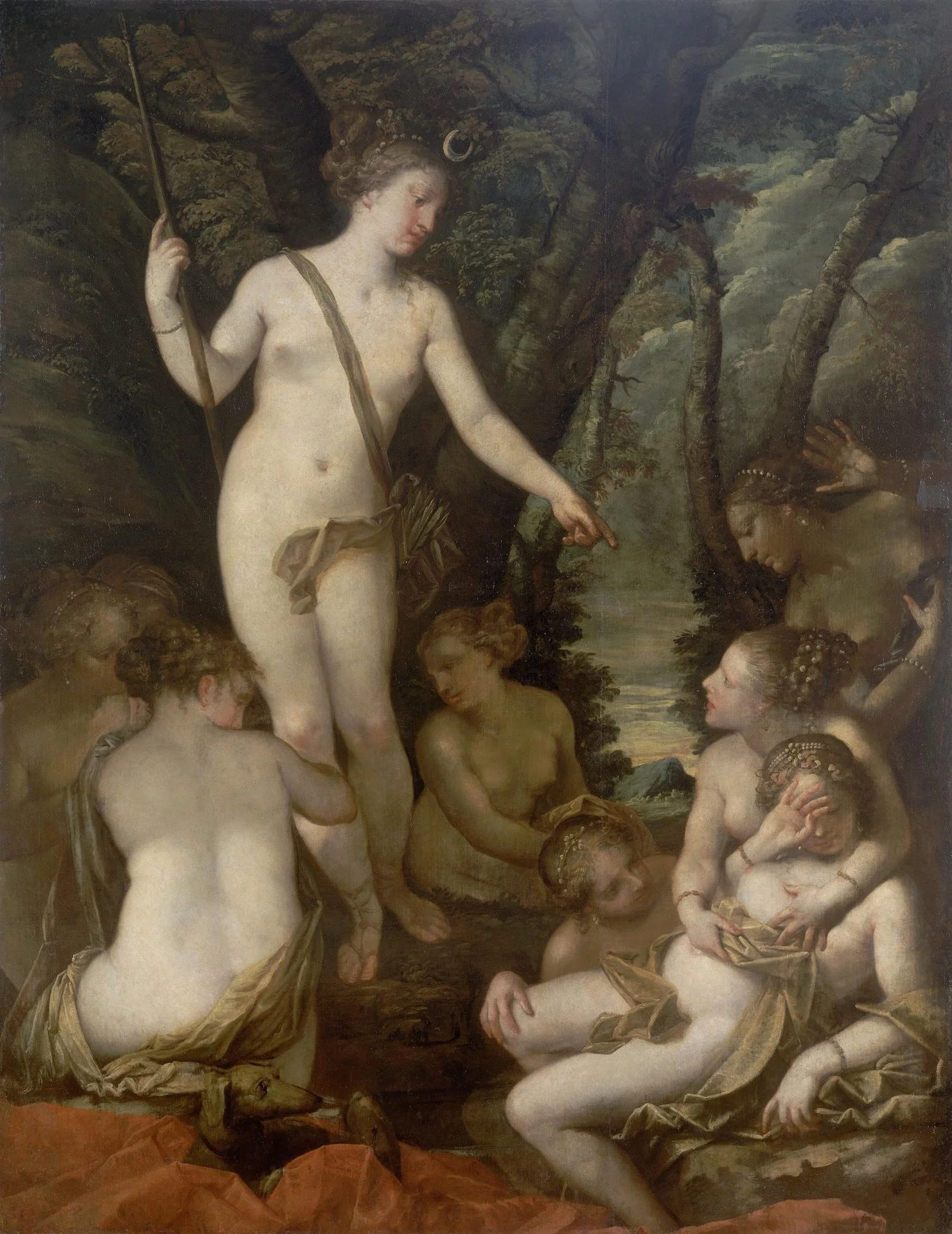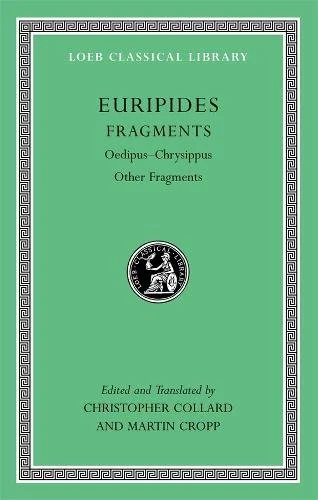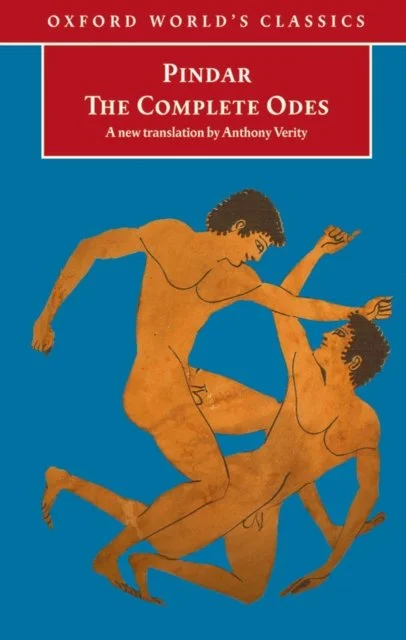Metamorphoses Readalong: Book 2
(CW: discussion of sexual assault and rape)
image: ‘The Death of Phaeton (Phaetonis Casus)’, Antonio Tempesta 1606
Welcome to week two of the Metamorphoses read-along!
We’re moving on from the creation (and re-creation) of the world and into stories of more human transformation. Here’s a quick summary of the myths from Book Two:
Metamorphoses Book 2: Summary
Phaethon (cont.)
The Sun offers Phaethon a gift. Phaethon demands to drive the Sun’s chariot. The Sun tries to warn him, but Phaethon loses control and begins to burn up the Earth. Jove strikes him down with his thunderbolt.
Reactions to Phaethon’s Death
The Sun goes into eclipse. Clymene mourns. Phaethon’s sisters mourn and are turned into poplar trees. Cycnus mourns and is turned into a swan. The gods convince the Sun to drive his chariot again.
Jove Rapes Callisto
Jove disguises himself as Diana and rapes Callisto. Diana banishes her when she sees Callisto is pregnant. Juno turns her into a bear. Callisto’s son almost shoots her, but Jove turns them into constellations.
The Raven and Coronis
Juno returns to heaven on a peacock-drawn chariot. The raven used to be white.
The Crow and Nyctimene
The crow warns the raven against being loyal to the gods. The crow, when she was a woman, was almost raped by Neptune; Minerva rescued her and turned her into a crow. She was Minerva’s aide until she was replaced by Nyctimene. Minerva punished the crow for gossiping.
The Raven and Coronis (cont.)
The raven tells Apollo that Coronis is cheating on him. Furious, Apollo kills her and almost kills her unborn child. He sends the baby to Chiron. He blames the raven and turns his feathers black.
Ocyrhoë Becomes Hippe
The gods are angered by Ocyrhoë’s talent for prophecy and turn her into a horse.
Battus
Mercury steals Apollo’s cattle. He gives Battus a cow in exchange for his secrecy. Mercury, in disguise, asks Battus about the theft; Battus reveals where the cattle are. Mercury turns him into a rock.
Mercury, Herse, and Aglauros
Mercury loves Herse. He asks her sister, Aglauros, for help. Aglauros asks for gold in return. Angry, Minerva sends Envy to infect Aglauros. Aglauros refuses to let Mercury see Herse. Mercury turns Aglauros into a stone statue.
Jove Rapes Europa
Jove disguises himself as a bull to win Europa’s trust. She mounts him and he carries her away into the sea.
“Be careful, son. Don’t let me give a gift that will destroy you.”
In Book One, we saw the world and humankind created and re-created. In Book Two, we find that the world only narrowly avoids another complete destruction.
We are introduced to more stories centred around male figures’ abuse of power and the sexual assault of women, but we also see goddesses - Diana, Minerva, and Juno - turn their backs on women and punish them for having been attacked.
Jove Rapes Callisto
image: ‘Jupiter in the Guise of Diana Seducing Callisto’, Jacob Adriaensz Backer (1608-1651)
Jove Rapes Callisto develops a theme that we saw emerge in Book One of the Metamorphoses: that of a male figure sexually assaulting a female figure. We see another alarming theme picked up on, too - that of transformation as ‘punishment’. In Book One Lycaön was transformed into a wolf as punishment for his savage behaviour but here we will see Callisto punished and transformed for the ‘crime’ of being raped.
At the beginning of Jove Rapes Callisto, Jove is ostensibly checking the structural integrity of the world in the aftermath of Phaethon’s disastrous chariot ride. But what he actually seems to be doing is going on the prowl to find more nymphs to assault.
He spots Callisto, ‘an Arcadian virgin’ (line 445). Ovid gives us a brief but lovely portrait of her as a someone not bound by the typical constraints of femininity: she does not weave, she does not tend to her appearance, she is uninterested in men. She is Diana’s ‘soldier’ (line 450) and Diana’s favourite - we are ominously told that ‘favour does not last’ (line 452).
(I think it’s interesting that the epithet used for Diana here is Trivia: this epithet refers to Diana’s position as goddess of crossroads, perhaps signalling this crossroads in Callisto’s life.)
Callisto is alone when Jove makes his move. She is tired. She seems to be taking a rest in an idyllic grove after a hunting session - and Jove considers this to be the perfect opportunity to attack.
We saw Jove’s behaviour in Book One, when he raped Io and transformed her into a cow. This time he acknowledges that his assault will cause issues between him and his wife Juno, but he thinks that the ‘conquest’ will be ‘worth’ the argument (lines 459-60): worth it for him, perhaps, but not for the multiple lives that will inevitably be destroyed once Juno discovers what he’s done.
Jove disguises himself as Diana. He approaches Callisto looking like the goddess that she trusts the most. He makes her feel comfortable with small talk. And then he kisses her ‘neither modestly nor like a virgin’ (line 467).
Callisto doesn’t seem surprised by this. She seems entirely relaxed and continues to talk to Jove (thinking he’s Diana) as they kiss and embrace. She acts as though it is a normal, everyday occurrence for Diana to kiss her: it’s the first hint of a queer, consensual love story in the Metamorphoses, and makes what happens afterwards all the more brutal.
“She fights, however much a female can. She fights, but what man could a girl subdue, or who could conquer Jove?”
Jove drops his disguise at the moment of penetration, ‘revealing himself to her as he commits his crime’ (lines 469-70). Callisto fights back, but she cannot fend him off. Once he has had enough of her he abandons her to her fate, apparently entirely unaffected by what he has done.
Callisto is traumatised. Diana’s soldier, a nymph of the woods, now hates the landscape as a ‘witness’ to her rape. She is scared of Diana, too, running away when Diana calls her, afraid that she is Jove in disguise again. She is subdued, she cannot make eye contact, cannot speak, appears embarrassed and humiliated by what has happened to her.
Ovid makes an interesting comment. He says that if Diana wasn’t a virgin she would have been able to tell what had happened to Callisto. And he says that the other nymphs could tell. Does this mean that they, too, have been victims of Jove’s abuse? Or have they had happier, consensual encounters with men? Either way, it’s clear that they’ve managed to conceal their loss of virginity from Diana, because she hasn’t punished them the way she will punish Callisto.
‘Diana and Callisto’, Pietro Liberi (1650s)
For nine months, Callisto hides her pregnancy. But one day Diana finds a lovely pool and suggests that they all go swimming. Callisto is afraid to undress, for obvious reasons, but is left with no choice: the other nymphs strip her, subjecting her to another violation, and reveal ‘the crime’ (line 502).
Diana calls Callisto a polluter and immediately banishes her. Ovid does not tell us if any of the other nymphs try to speak up on Callisto’s behalf or offer her any form of comfort. He does not tell us where Callisto went, whether she had any family or friends who might take her in. We skip forward, to when Callisto has given birth to a son, Arcas, and when Juno decides to take her vengeance.
Callisto is punished by Diana, her companion and her lover, and then by Juno, the wife of the god who raped her. Diana forces her away from her home and her friends and her lifestyle, and then Juno takes away her body and her voice and her child. Juno turns her into a bear.
“You’ll pay, you nuisance! I will take from you that form you and my husband so enjoy.”
In Book One, we saw Apollo attempt to rape Daphne. It was a difficult story to read and a complicated one, too: Cupid had infected Apollo with desire for Daphne and it was hard to tell how much Apollo was in control of the situation. Here, though, Cupid and Venus are both conspicuously absent. Here, Jove acts out of selfishness, greed, and a lust entirely of his own making.
But Jove does one good thing. Arcas, now fifteen, spends his time hunting in the woods and one day encounters a bear. He doesn’t realise that the bear is his mother but she recognises him, longs to approach him. He aims his spear at her but before he can commit matricide, Jove raises them both up to the heavens to become constellations.
Juno is furious. Her anger and her jealousy seem to cloud her judgement: she sees Jove’s actions as making Callisto a goddess and usurping her position in the skies. She calls Callisto ‘her rival’, unable (or unwilling) to see that it’s Jove who is to blame for her unhappiness.
I think this says something about the impossible standards that the Olympian gods expect women to maintain in the Metamorphoses. Diana expects her companions to remain virginal, unpenetrated, but does little to protect them from the dangerous gods lurking in the idyllic landscapes they inhabit. Juno blames Callisto for being raped by Jove and punishes her brutally, refusing to acknowledge that Jove is the problem, letting him get away unpunished.
It’s a theme that, unfortunately, we will not just see repeated through the Metamorphoses, but through thousands of years of literature and real life.
Explore the stories from Book Two of the Metamorphoses further
Throughout the Metamorphoses, Ovid alludes to, parodies, expands on, or deliberately omits many older and contemporary texts. Here are some recommendations for Greek texts that inspired the stories Ovid tells in Book Two - plus some more modern discussions and adaptations you might be interested in exploring!
Phaethon, Euripides
Read the tantalising fragments of Euripides’ lost play, where Phaethon is a reluctant groom who rides alongside his father.
Pythian 3, Pindar
Read Pindar’s extended version of the stories of Coronis and Asclepius.
Homeric Hymn to Hermes
Read a different account of Hermes stealing Apollo’s cattle.
Phaethon (Christopher Rouse)
Rouse’s symphonic poem, dedicated in memory of the crew of the Space Shuttle Challenger, was inspired by Phaethon’s chariot ride.
Parody & Humour in the Tale of Jupiter and Europa (Millennial Classicist)
Maria discusses how Europa’s story is treated by Ovid, Horace, and Moschus.
LIII: Jupiter & Neptune Ruin Everything (Let’s Talk About Myths, Baby!)
Liv takes a look at the stories of Callisto and Caenis.






